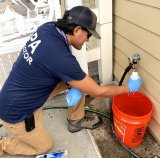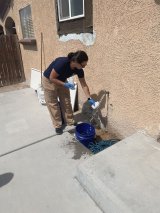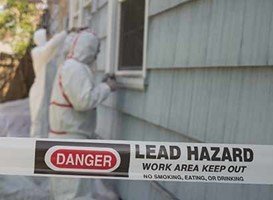Enforcement and Compliance Assurance Annual Results for FY 2024: Federal Facilities
The Environmental Protection Agency’s enforcement and compliance assurance program focuses on many pressing environmental problems impacting the communities that work or live at or near U.S. government facilities. The U.S. government and its federal agencies must comply with environmental laws and regulations in the same manner and to the same extent as any other regulated facility. In fiscal year 2024, EPA’s federal facilities enforcement and compliance program addressed environmental issues at and near federal facilities, including per- and polyfluoroalkyl substances or PFAS contamination from U.S. military facilities and lead exposure in U.S. privatized military housing. EPA collaborated with states and Tribes to address contamination at Superfund sites, and ensured hazardous waste storage, treatment, and disposal facilities were monitored and violations addressed.
Federal facilities are generally buildings, installations, land, public works, and equipment owned or operated by the federal government. These facilities include hundreds of military installations, ammunition plants and ordnance ranges, public water systems, federal prisons, national parks and forests, hazardous waste treatment, storage, and disposal facilities, and some of the largest and most contaminated Superfund cleanup sites – all of which can have a tremendous impact on the communities and environment around them.
EPA’s enforcement and compliance assurance highlights for federal facilities in FY 2024 follow.
EPA and the DOD Collaborate to Identify PFAS Contamination Near Military Installations

In FY 2024, EPA conducted sampling of private drinking water wells located near five military installations: Fort Carson (Colorado), Camp Santiago and Fort Allen (Puerto Rico), and Nellis Air Force Base and Reno Air National Guard Base (Nevada). This sampling, conducted to implement EPA’s Addressing Exposure to PFAS National Enforcement and Compliance Initiative, is in close collaboration with states and territories and the Department of Defense.

Sampling will help ensure that service members, military families, and communities living near military installations with known PFAS contamination are drinking clean water. EPA and the U.S. Army also initiated a joint project to sample private drinking water wells near nine Army installations where there is known, significant PFAS contamination in groundwater. The sites with the highest potential for off-site drinking water impacts are targeted for PFAS sampling under the program. These are: Fort Novosel (Alabama); Fort Hunter Liggett – Parks Reserve Forces Training Area (California); Fort Stewart (Georgia); Fort Stewart – Hunter Army Airfield (Georgia); Blue Grass Army Depot (Kentucky); Fort Campbell (Kentucky/Tennessee); Fort Liberty (North Carolina); Fort Sill (Oklahoma); and McAlester Army Ammunition Plant (Oklahoma). EPA and the Army will sample drinking water wells near additional Army installations after these nine have been completed.
Protecting Military Families Against Lead in Privatized Military Housing
As part of EPA’s Strategy to Reduce Lead Exposures and Disparities in U.S. Communities, the federal facilities enforcement and compliance program is continuing efforts to increase property management company compliance with the Toxic Substances Control Act’s Lead Renovation Repair and Painting (RRP) rule and Real Estate Notification and Lead Disclosure (LDR) rule to protect military families living in privatized military housing managed by commercial property management companies.

In FY 2024, EPA lead-based paint investigations resulted in administrative settlements, notices of noncompliance, and formal advisory letters with seven renovation, repair, and paint companies: Frontier Contractors; Dynamic Renovation Contractors LLC; A. & L. Aluminum Mfg. Co., Inc.; KJP LLC and RC Roofing & Renovations.com; E&J Painting, LLC (Swann Painting); Fresh Start NY Cleaning Corp.; and Squire Contracting, LLC. Violations included failure to obtain EPA lead-safe firm certification, maintain records documenting compliance, and failure to comply with pre-renovation education requirements.
EPA also conducted 19 compliance monitoring activities at 18 military installations. This work ensures that service members and their families are protected from exposure to lead-based paint in their homes on military bases. EPA also provided compliance assistance to the Department of Veterans Affairs, property developers, lessees, and property management companies responsible for operating and managing residential housing for veterans and their families.
Bradford Island Cleanup to Include Tribal Input
EPA and U.S. Army Corps of Engineers (USACE) agreed to a Federal Facility Agreement (FFA) to ensure timely cleanup of the heavily contaminated Bradford Island Superfund site in Cascade Locks, OR. EPA and USACE also negotiated, for the first time in their history, three separate memoranda of understanding (MOU) with interested Tribes to ensure meaningful Tribal participation in the cleanup work.
Bradford Island is located on the Columbia River and is part of the Bonneville Dam complex operated by USACE. The Bradford Island FFA, signed by EPA, USACE, and the states of Washington and Oregon, will address contamination stemming from USACE historical operations and practices that resulted in waste disposal of electrical equipment directly into the Columbia River, contaminating soil, groundwater, stormwater, and sediment with polychlorinated biphenyls (PCBs), polycyclic hydrocarbons (PAHs), heavy metals, and other contaminants. Read more: Bradford Island Superfund site profile webpage.
Ensuring Federal Facilities Comply with Hazardous Waste Requirements
EPA helps to protect human health and the environment by ensuring federal facilities comply with Resource Conservation and Recovery Act (RCRA) treatment, storage, and disposal (TSD) regulatory requirements through annual inspections of federal TSD facilities and enforcing against noncompliant facilities. In FY 2024, and in collaboration with the 10 EPA regional offices and state partners, all 117 federal TSD facilities met their annual inspection requirement. EPA also increased its number of credentialed RCRA inspectors, and for the first time was able to supplement typical inspections at federal facility TSDs with waste sampling activities to more fully evaluate compliance.
EPA also identified and resolved RCRA noncompliance through multiple hazardous waste enforcement actions at federal facilities, including at U.S. Army Garrison Fort Wainwright, and U.S. Coast Guard Station Kodiak, both in Alaska. At Fort Wainwright, RCRA violations included improperly labeling and storing hazardous waste, and failing to mark containers with appropriate hazard indicators. The Army paid a penalty of approximately $233,000. At U.S. Coast Guard Air Station Kodiak, violations included the failure to make a hazardous waste determination, improper storage and management of universal waste, and failure to comply with reporting and other permit requirements. The Coast Guard paid a penalty of approximately $18,000.
Keeping Drinking Water Safe at Federal Facilities
EPA works to ensure that all military service members, military families, and nearby communities have safe water to drink at the facilities where they live and work. Among the many Safe Drinking Water Act (SDWA) enforcement actions in FY 2024, EPA initiated an action against the U.S. Navy at the Great Lakes Naval Training Station in North Chicago, IL to address numerous operational violations. Under the agreement, the Navy is required to design and construct infrastructure upgrades that will bring the facility into compliance and ensure clean drinking water to the approximately 23,000 people that the system serves. This agreement is a template for resolving future SDWA noncompliance at federal facilities.
EPA’s Chemical Accident Risk Reduction National Enforcement and Compliance Initiative
EPA is committed to improving safety and lowering the risk of chemical accidents at federal facilities. In support of EPA’s Chemical Accident Risk Reduction National Enforcement and Compliance Initiative, EPA entered into an administrative compliance order on consent with BAE Systems, a government contractor, at the Radford Army Ammunition Plant in Blacksburg, VA. This administrative order requires BAE Systems to return the facility to compliance with the Clean Air Act’s Risk Management Program by minimizing potential exposure to extremely hazardous substances. This creates a safer environment for military and civilian workers at the plant and for the surrounding community.
Precedential Superfund Cost Recovery Case at Army’s Rocky Mountain Arsenal in Colorado
Under the long-term Rocky Mountain Arsenal (RMA) Superfund Federal Facility Agreement and consent decree, the U.S. Army is required to reimburse EPA for the cost of remedial oversight activities at this site formerly used for weapons and chemical manufacturing.
In 2015, the Army failed to continue its long-term practice of paying these oversight costs to EPA, citing a lack of legal authority. In 2020, EPA filed a groundbreaking administrative complaint under CERCLA section 109 to require the Army to pay EPA oversight costs, seeking $11.5 million in penalties. The FFA was finalized in 2021, and EPA began multi-party negotiations to amend the consent decree. The Army agreed to pay EPA $10.2 million to fully reimburse oversight costs, and a consent decree amendment was approved by a federal court in September 2024, thus ensuring the long-term maintenance and safety of the site.
